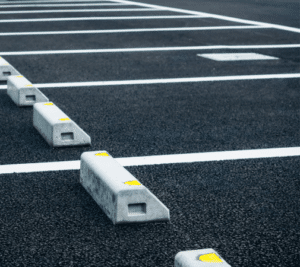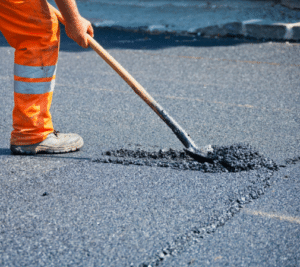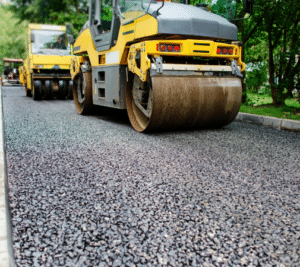When it comes to residential properties, landscaping is essential in transforming the visual appeal of a home. From trees and bushes to garden sculptures and fountains, landscaping is a crucial element that can help bring out the beauty in any home. But, while all of these elements benefit your property, they can indirectly harm your asphalt. Here are three ways your landscaping is damaging your asphalt:
Fertilizers Can Harm Your Asphalts Surface
While your landscaping can benefit from using fertilizers by supplying your plants with nutrients, these fertilizers can harm your asphalt. Fertilizers and plant food often contain minerals, including magnesium, iron, copper, and zinc. When these minerals, especially iron, come in contact with your surface, they can cause discoloration and even harm the integrity of the asphalt. If you accidentally spill fertilizer on your asphalt, grab a broom and remove it as quickly as possible. This will keep it from coming in contact with water and avoid triggering oxidation.
Sprinklers can cause excess water buildup on your asphalt and cause erosion.
Even if your landscaping features no vegetation with shallow roots, there is a risk of excessive water buildup and subsequent asphalt erosion due to sprinkler irrigation. With sprinklers, it’s possible to waste large amounts of water by running the system for long periods, causing water to pool on your asphalt. When water pools for extended periods, it can lead to erosion and have a damaging effect on the asphalt beneath it. When using sprinklers, be sure to aim them toward areas where the asphalt isn’t present. When possible, consider using drip irrigation systems, which are more effective at delivering water to plants while minimizing runoff and other issues that can cause problems for your asphalt.
Roots Can Cause Asphalt to Crack
Because trees have extensive root systems that need water and nutrients, their roots grow deeper and spread wider in search of those necessities. As the roots grow and expand over time, they can provide significant pressure underneath any surrounding asphalt. This can cause your asphalt to lift, causing cracks, bulges, or buckles in the pavement.
If you don’t have any trees but are thinking about planting some, it’s essential to be mindful of where you plant the tree and the type of tree you decide to plant. Some trees, such as a crape myrtle, have non-invasive roots that will not damage your asphalt, sidewalks, or foundations. If you already have established trees close to your asphalt, keep an eye on them. Monitor any signs of cracking or visible roots; if you notice any, call a professional tree-trimmer to prevent further damage.
Signs You Need Asphalt Repair
- Cracking: If your asphalt begins to crack, you should call an expert to assess the damage. Small cracks can usually be filled or patched, so the sooner you get asphalt repair, the better.
- Potholes: A pothole is a hole formed through rock erosion, generally resulting from water. Sprinklers and other irrigation systems can cause water to build up. If the water sits on your asphalt surface for too long, it can damage the base layer, causing a pothole to form.
- Stains: Certain substances, like chemicals from your car or some fertilizers, can cause stains to form on your asphalt. If the stains are not addressed, they can continue to spread and soak into your asphalt, potentially causing problems in the future.
Conclusion
When landscaping, it’s essential to consider how the materials you choose may affect your pavement. You can reduce the risk of damage by weeding out any materials that could cause an issue with your asphalt. This can also help to extend the longevity of your asphalt. If you notice your asphalt is cracking, don’t wait until it’s a severe problem. It would be best to have it repaired as soon as possible to avoid further issues.
If your beautiful landscaping has caused not-so-beautiful damage to your asphalt, Saguaro Asphalt can help with your asphalt repair needs! We have the experience and expertise to repair any cracks or imperfections your landscaping may have caused to your asphalt. Contact us at (520) 428-0505, and let’s see how we can help!



